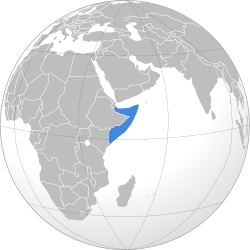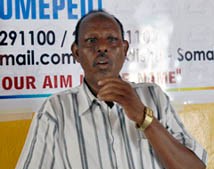Reporters Without Borders alerts the international community to the collapse of the security situation in Somalia and the living hell its journalists are having to endure as a result of a major offensive launched on 23 August by Al-Shabaab against government troops and the soldiers of the African Union Mission in Somalia (AMISOM).
Impact on media and information
In addition to the many casualties in the fighting, the offensive has also had a serious impact on the media and information.
“We voice our support for Somalia’s journalists and we appeal to the international community to give them help and solidarity,” Reporters Without Borders said. “They need to be covering the suffering of the civilian population in the fighting raging i n Mogadishu but they are unable to do so because it is too dangerous.”
n Mogadishu but they are unable to do so because it is too dangerous.”
The press freedom organisation added: “A journalist has just been killed by stray bullet while Al-Shabaab continues to try to control news and information by sowing terror and using local media to broadcast its hate messages and its calls for holy war.”
A journalist still in Mogadishu told Reporters Without Borders: “The media is facing increasing pressure at this moment and censorship is reaching its highest levels.” Heavy pressure has, for example just forced Radio Shabelle, Somalia’s leading independent radio station, to stop broadcasting its “Tartan Aqooneedka Shabelle” talk show.
Shot on duty
Awale, 60, director of the community radio station Hurma Radio, was on the roof of the station assisting a technician in fixing the station’s transmitter when a stray bullet hit him in the stomach, local journalists told Committee to Protec Journalists (CPJ). His colleagues rushed him to Madina Hospital, where he was pronounced dead upon arrival.
He was the second media fatality in Somalia this year. The first was another veteran journalist from Radio Mogadishu Sheik Nur Mohamed, who was killed on 4 May by three gunmen near his home in southern Mogadishu (see the 5 May release).
Awale’s death came during some of the most intense recent fighting between Al-Shabaab insurgents and African Union troops, local journalists told CPJ. Earlier this morning, at least 33 people were killed when two suicide bombers detonated explosives at the Muna Hotel, located near the presidential palace, according to a statement by Information Minister Abdirahman Omar.
“We send our deepest condolences to the family and colleagues of Barkhat Awale,” said CPJ’s East Africa Consultant Tom Rhodes. “Both sides of the conflict have shown no regard for the lives of journalists and other civilians. We call on African Union troops and Al-Shabaab to safeguard the lives of journalists.”
Awale had worked in the media for the last 30 years and was director of Hurma Radio for the past four, the National Union of Somali Journalists reported. Hurma Radio primarily covered social issues, local journalists told CPJ. The station, based in the government-controlled KM5 area, has been off the air recently due to technical problems that the staff had been trying to fix.
Destructive activity
On Monday, the Al-Shabaab rebels took over privately owned Radio IQK in northern Mogadishu, local journalists told CPJ. Al-Shabaab issued a statement claiming Radio IQK was a public station.
Al-Shabaab and one of Somalia’s other leading Islamist militias, Hizb-Al-Islam, are on the Reporters Without Borders list of Predators of Press Freedom.
Dozens of civilians have been killed in the fighting of the past few days. An attack on the Hotel Muna, which was claimed by Al-Shabaab, left around 30 dead including six parliamentarians.
HRH Bergen, based on Reporters Without Borders and Committee to Protect Journalists information (see here here and here).
Related links:





